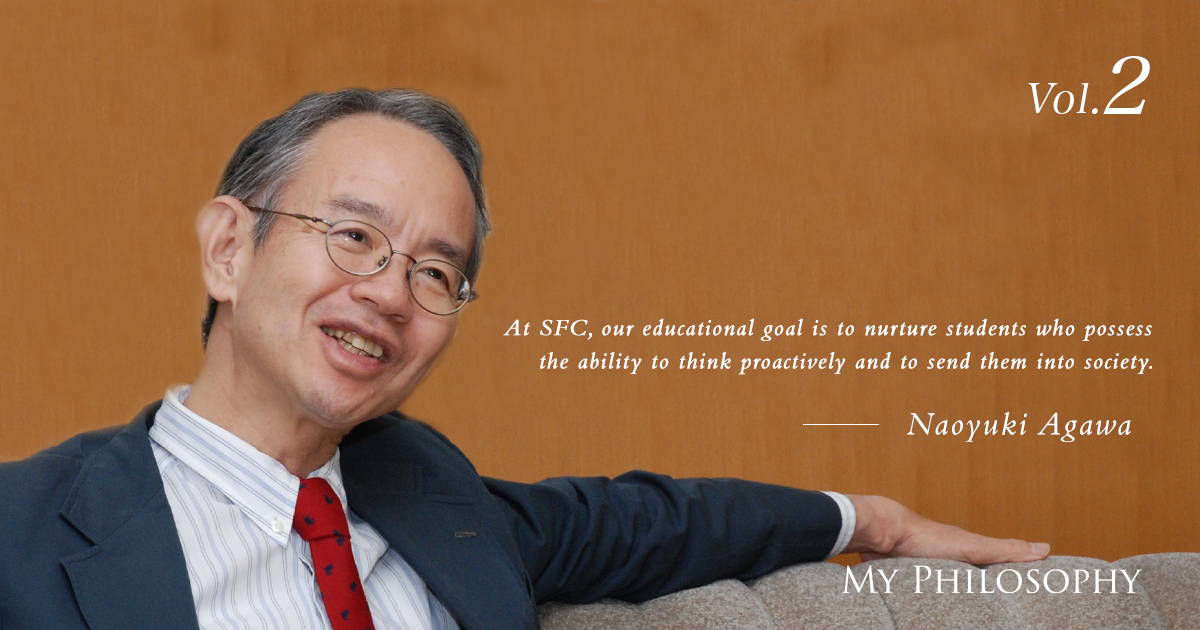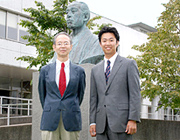
In 1990, Keio University established the Faculty of Policy Management and the Faculty of Environment and Information Studies, interdisciplinary faculties that integrate humanities and sciences. By 2010, these faculties had reached their 20th year. In June 2007, Professor Naoyuki Agawa became the dean of these faculties. We spoke to him about the future of SFC (Shonan Fujisawa Campus).
Profile
Vol.2 Naoyuki Agawa
Dean of the Faculty of Policy Management at Keio University.
After leaving the Department of Political Science at the Faculty of Law of Keio University, Naoyuki Agawa graduated from Georgetown University's School of Foreign Service and the
the Law Center in the United States. Before joining Keio University as a professor in the Faculty of Policy Management in 1999, he worked for Sony Corporation and a law firm in the United States. From 2002 to 2005, he served as Minister for Public Affairs at the Embassy of Japan in the United States. He returned to Keio University in 2005 and became the Dean of the Faculty of Policy Management in 2007. In 2009, he was appointed as a Permanent Trustee of Keio University. Additionally, he has held positions such as an advisor to Nishimura & Asahi Law Office, visiting professor at the University of Virginia School of Law, visiting professor at Georgetown University Law Center, and visiting lecturer at the Faculty of Law of Doshisha University.
*Titles and positions are as of the time of the interview (August 2007).
Appointed as Dean of the Faculty of Policy Studies
Upon assuming the role of Dean of the Faculty of Policy Management: When I joined SFC in 1999, the training I had received as a lawyer, especially the teaching and learning methods I experienced in law school, proved to be invaluable. In American law schools, you hardly study the text of laws. Instead, you undergo rigorous training to develop the ability to think through legal issues on your own. Although I wasn’t sure how much of this could be implemented at SFC, I aimed to incorporate such educational practices from law school, providing experiences that lead students to understand what it means to “think legally.”

From my seminar, many students have gone on to law school. By reading a lot of American constitutional case law, you begin to grasp what it means to “think legally.” Based on this experience, they advance to law school to study law in a more systematic way. Or through this experience, they understand what it means to think. They grasp something at SFC and then go out into society. This is the most gratifying thing as a teacher. Even after graduating, they remember me and come back to visit, having grown even more. It’s like I only helped plant the seedlings of a radish, but seeing them grow into fine radishes makes me think that teaching is a great profession.
The Future of SFC
I consider the current state of SFC to be Keio’s third dream. The first dream was that of Yukichi Fukuzawa, the founder of Keio University. In his youth, Fukuzawa studied fervently at Tekijuku in Osaka, taking breaks only to drink sake or eat before returning to his studies. He was free yet orderly, and I believe he possessed a certain sense of mission. When he first proclaimed the establishment of Keio Gijuku, he wrote in”The Guide-book of Keio Gijuku,” “Let’s create a school unlike any before, here and now. A place where anyone with aspiration, regardless of status, can come to study freely and extensively. We may not have traditions now, but let’s create them from this point forward.”

About 120 years after its foundation, while both the Mita and Hiyoshi campuses had developed impressively, there was a concern that the university might become stagnant as it expanded. It’s important to thoroughly learn within a single academic system, but the idea was raised to revive Fukuzawa’s dream of studying anything with a sense of problem awareness, not just cramming law in the Law Faculty or economics in the Economics Faculty, but studying like the early days of Keio Gijuku without being confined to specific fields.
After several faculty members debated that Keio could not develop further in its current state, a plan was conceived to create a campus for new and unprecedented education. The central figures in this plan were the first Dean of the Faculty of Policy Management, Hiroshi Kato, and the first Dean of the Faculty of Environment and Information Studies, Hideo Aiso. They, supported by the then President Tadao Ishikawa, aimed to create an innovative school where education and research could be more freely conducted, unbound by academic disciplines or the traditional mentorship between teachers and students. Thus, the second dream was realized.
The founding philosophy of SFC is correct and must be carried forward. However, after 18 years, there’s also a need for reflection. We cannot merely nibble at the accumulated legacy and achievements of the past. We must rethink from the ground up and adopt a solid direction once again. A lot of faculty members have engaged in vigorous discussions to create a new curriculum, leading to the creation of a new subject called “the creation of policy management” and the initiation of a mentorship system. We, the SFC community, are discussing new dreams and working towards realizing them. This is the third dream.
Whether There’s a Commitment
Not everyone has a clear goal from the beginning, so it’s perfectly fine to embark on a journey of self-discovery after entering SFC. However, once you find something that interests you, it’s essential to have the concentration to pursue it thoroughly. It doesn’t matter what the subject is, but without the persistence to delve deeply into things, neither academic nor professional growth is likely. It’s not just about having an interest; what’s crucial is the focus and commitment to that interest and the ability to think critically about it.
Moreover, this is an issue for the school as well: there’s a need to have faculty members who can impart the ability and the will to look at the wider world from one’s field of expertise, especially to students who are intensely working on their interests. When there are teachers with rich imagination and unique ways of thinking, students with distinctive personalities naturally gather. Whether a school can or cannot achieve this is a true measure of its capability. However, gathering such faculty members is extremely challenging.
The Duality of Things

There’s a saying in the Analects of Confucius: “Learning without thought is labor lost; thought without learning is perilous.” This means that hardworking individuals who lack interest in societal matters and possess a narrow view will not progress. Conversely, those only interested in the practical aspects of society but who neither study the basics nor possess the method or power to think critically are precarious. People who are excessively busy or solely focused on their work lack appeal. Similarly, those who only study are not attractive either.
Fukuzawa Yukichi also advised not to be overly engrossed in academic pursuits, saying, “Of course, I want you to love learning and engage in it with all your might. But you should not become obsessed with it. It’s not everything. You should continue learning, but you also need to maintain a certain distance from it.” This is a very clear-sighted statement.
I believe it’s important not only to study but also to always be aware of the duality of things. A student once told me that the word for “learn” in Japanese comes from “mimicking” or imitating seniors to acquire a “form.” Often, people at SFC do not understand the importance of having a “form,” but it’s not good to send someone into society without it. There’s a term “breaking the mold,” and while research or art that does so can be fascinating, without a “form” in the first place, there’s nothing to break.
Message to SFC Students and Alumni
Having passion is wonderful, but I also wish you’d take the time to stand still, be alone, and value deep, broad thinking about philosophical, literary, or religious matters. Have something precious that’s uniquely yours, a world vastly different from your everyday self, a world that belongs to you alone. My creed is, “To be realistic while also being an idealist.” This means that people who live only by ideals tend to only speak of beautiful notions, which can eventually turn into lies. On the other hand, focusing solely on reality can lead to a dead end. I want to hold onto both reality and ideals. I feel that having only one or the other isn’t enough. There’s no need to chase after too grand an ideal or a profound sense of impermanence.

In the discourse of Professor Agawa, the emphasis on the importance of “thinking” for problem identification and problem-solving, as well as the significance of being aware of the “duality of things,” left a lasting impression. I am convinced that the process of “thoroughly thinking” is crucial for navigating the rapidly changing environment we live in.
August 2007, at Keio University SFC,Edited by Naomi Kusuda,Photography by Daiki Ayuzawa
































































